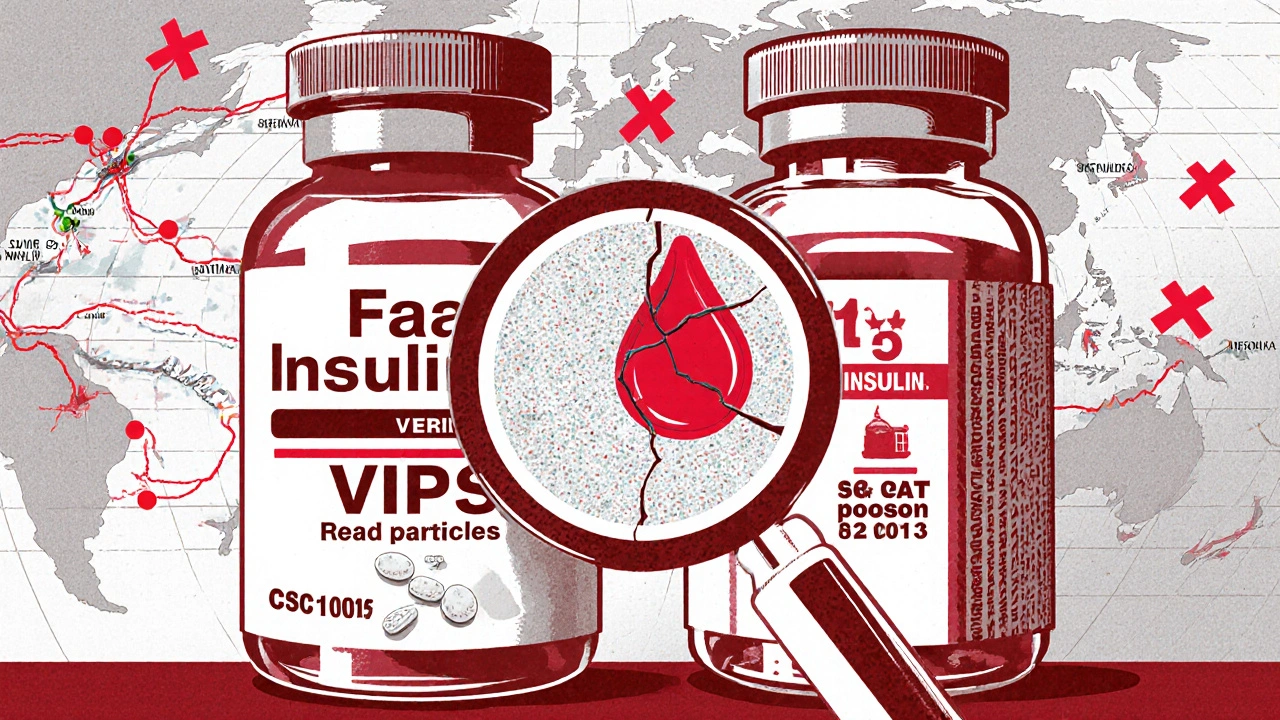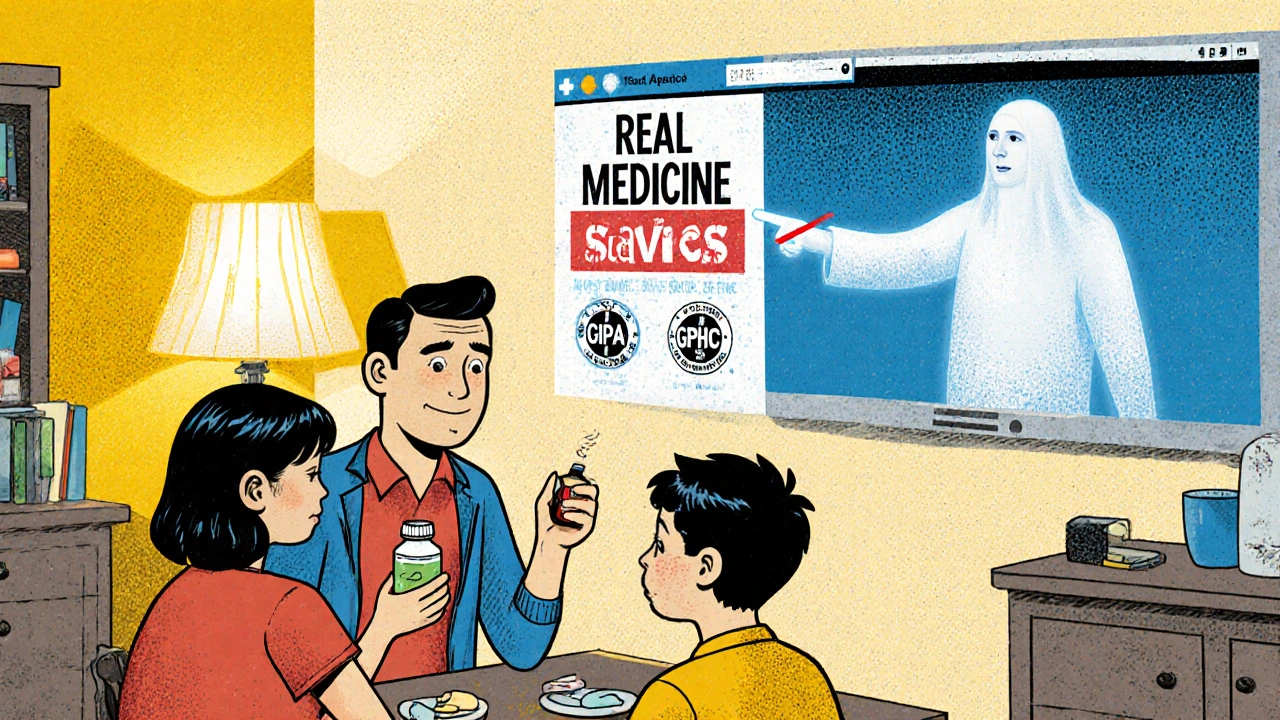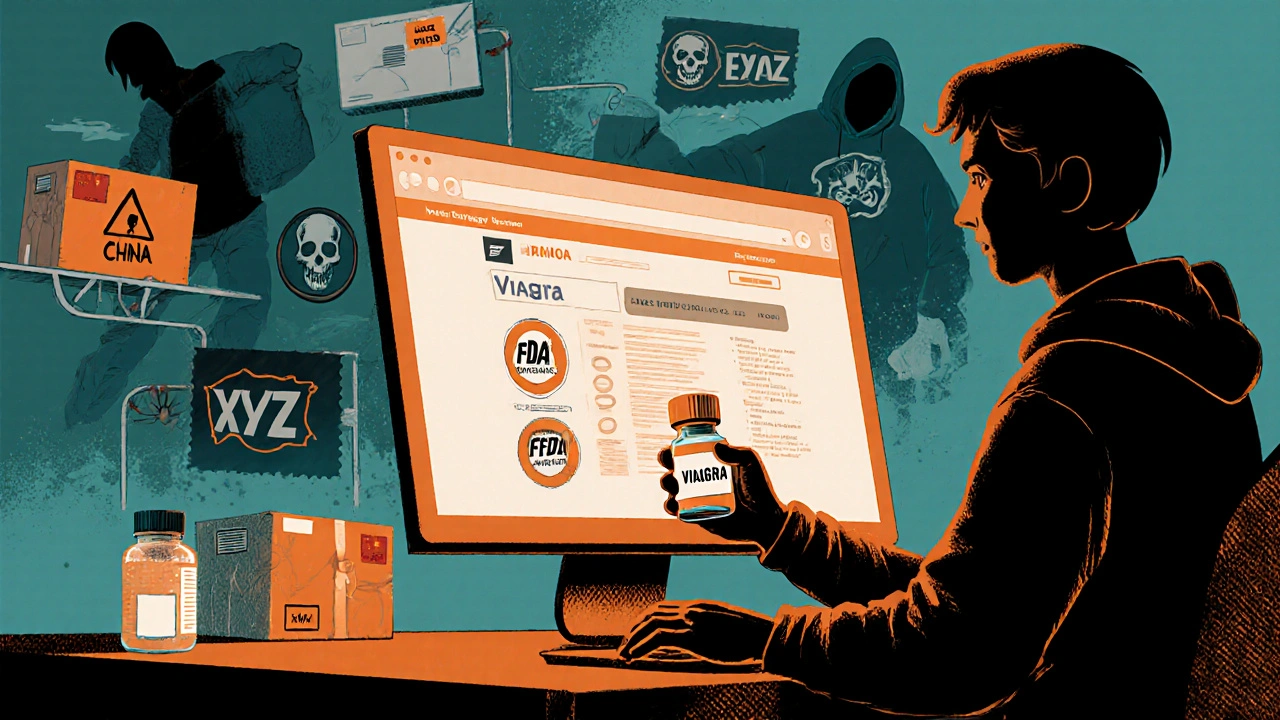Buying medicine online from another country might seem like a smart way to save money-especially when prescription prices at home are high. But what looks like a deal could be a life-threatening mistake. Every year, millions of people order pills from websites that look real but sell fake, dangerous drugs. These aren’t just inferior versions-they’re often laced with toxic chemicals, missing active ingredients, or packed with deadly doses. And the people buying them? They think they’re getting the same medication their doctor prescribed.
What Exactly Are Counterfeit Drugs?
Counterfeit drugs aren’t just knockoffs like fake sneakers or copied handbags. They’re medical products that have been deliberately mislabeled or altered to look real. The World Health Organization breaks them into two types: substandard and falsified. Substandard drugs are made poorly-maybe they expired, were stored wrong, or didn’t meet quality rules. Falsified drugs are outright lies: they might say they contain metformin for diabetes, but instead have chalk, rat poison, or industrial dye. Some even have the right name but the wrong strength-like a 500mg pill that’s actually 50mg or 2,000mg.These fake drugs don’t just fail to work-they can kill. In 2024, law enforcement agencies around the world seized over 50 million doses of counterfeit medicine in a single operation. Among the most common targets: erectile dysfunction pills, weight-loss drugs, cancer treatments, and antibiotics. One study found counterfeit anti-malarial pills contained as little as 14% of the needed active ingredient. That means patients aren’t just wasting money-they’re dying from preventable diseases because the medicine didn’t work.
How Do These Fake Drugs Get to You?
It’s not hard to find them. A quick Google search for "buy Viagra cheap online" brings up hundreds of sites that look professional-complete with logos, fake certifications, and even live chat support. These sites are run by criminal networks based in places like China, India, and Southeast Asia. They ship packages directly to your door, often disguised as regular mail. In May 2025, INTERPOL shut down 13,000 websites and social media pages selling illegal drugs. Many of these sites were hosted outside the U.S., Canada, and Europe to avoid legal action.Here’s how it works: A criminal group makes fake pills in an unregulated factory. They package them to look like Pfizer, Novartis, or Merck products. Then they use paid ads on Google and Instagram to target people searching for lower prices. The site looks legit-secure checkout, SSL certificate, even a "pharmacist on call" button. But none of that means it’s legal or safe. In fact, 93% of the drugs seized during the 2025 global crackdown had no approval from any national health authority.
The Real Danger: What’s Inside the Pills?
You can’t tell a fake pill by looking at it. Even experts need lab tests to spot the difference. But here’s what’s been found in counterfeit drugs:- Antibiotics with no active ingredient-leading to untreated infections and antibiotic resistance
- Erectile dysfunction pills with 198% more sildenafil than labeled-causing heart attacks and vision loss
- Diabetes meds with heavy metals like lead or arsenic
- Cancer drugs with no chemotherapy agents at all
- Insulin made with sugar water
One Reddit user reported ordering "Viagra" from a website based in India. The pills looked identical to the real thing. But after taking one, he suffered priapism-a painful, hours-long erection that required emergency surgery. Lab tests later showed the pill contained 147mg of sildenafil-over twice the legal dose. He wasn’t alone. Multiple users on pharmacy forums shared similar stories: blurred vision, chest pain, seizures-all from pills bought online.
It’s not just about overdoses. Underdosing is just as dangerous. A patient taking counterfeit antibiotics for a lung infection might feel better for a few days-because the pill has a tiny bit of the drug. But not enough to kill all the bacteria. The surviving germs become stronger. That’s how superbugs form. The OECD estimates counterfeit medicines contribute to between 72,000 and 169,000 child deaths from pneumonia each year.

Why People Still Buy Them
You’d think after all the warnings, people would stop. But they don’t. Why?- Cost: A 30-day supply of insulin in the U.S. can cost $300. In Canada, it’s $30. Many buy from Canadian pharmacies-without checking if they’re real.
- Convenience: No doctor visit. No insurance hassle. Just click, pay, wait.
- Desperation: People with chronic conditions, no insurance, or shame around their illness (like ED or mental health meds) avoid talking to doctors.
- Trust in appearance: Fake sites look better than many real pharmacies. They use real logos, fake FDA seals, and testimonials.
A 2024 survey found that 18% of Americans have bought prescription drugs from overseas. But 72% of them never checked if the pharmacy was legitimate. That’s like buying a car from a stranger on Craigslist and not looking under the hood.
How to Spot a Legit Online Pharmacy
Not all international pharmacies are fake. Some are legal, licensed, and safe. But you have to know how to tell the difference. Here’s what to look for:- Requires a valid prescription-no "no prescription needed" claims
- Has a physical address and phone number you can call
- Displays a verified pharmacy seal: VIPPS (U.S.), CIPA (Canada), or the EU’s common logo
- Lists a licensed pharmacist you can speak to directly
- Is registered with your country’s health authority (e.g., FDA, MHRA, TGA)
Use LegitScript’s free checker or the National Association of Boards of Pharmacy’s VIPPS database. Only 14% of online pharmacies pass their verification. If a site doesn’t show this info clearly, walk away.
Here’s a red flag: If the website’s domain ends in .xyz, .top, or .ru, it’s almost certainly fake. Legit pharmacies use .com, .ca, .uk, or .eu.

What Happens If You Get Caught?
Some people worry about getting in trouble for ordering medicine from abroad. In most cases, if you’re buying for personal use and it’s not a controlled substance, customs won’t seize it-or if they do, they’ll just send you a warning letter. But here’s the catch: if the package contains a counterfeit drug, and you take it and get sick, you have no legal recourse. No refund. No lawsuit. No compensation. You’re on your own.And if you’re importing large quantities? That’s different. Customs can charge you with drug trafficking. In the UK, the MHRA works with Border Force to intercept illegal shipments. In 2025, over 5 million units of fake drugs were seized in the UK alone-many of them ordered by individuals.
What to Do If You’ve Already Bought Fake Medicine
If you’ve taken pills from an unverified site and feel unwell-call your doctor immediately. Don’t wait. Tell them you bought medication online. Bring the pills with you, even if they’re empty. If you feel fine but suspect the pills are fake, stop taking them. Don’t flush them. Don’t throw them in the trash. Take them to a pharmacy that offers safe disposal.Report the website. In the U.S., file a report with the FDA’s MedWatch program. In the UK, use the MHRA’s Yellow Card system. In Canada, report to Health Canada. These reports help authorities track and shut down these operations.
The Bigger Picture
This isn’t just about one person buying a fake pill. It’s a global crisis. Criminal networks make up to 9,000% profit on counterfeit drugs. That’s more than drugs like cocaine or heroin. And they’re targeting the most vulnerable: cancer patients, diabetics, people with mental illness. These aren’t just illegal-they’re murderous.Organizations like Pfizer and the WHO have spent years fighting this. Pfizer has stopped over 302 million fake doses since 2004. INTERPOL’s 2025 operation led to 769 arrests across 90 countries. But as long as people keep buying from shady websites, the market will keep growing.
Real medicine saves lives. Fake medicine destroys them. There’s no middle ground.
Can I trust international pharmacies that claim to be "FDA approved"?
No. The FDA only approves drugs and pharmacies within the U.S. No foreign pharmacy can be FDA-approved. If a site says "FDA approved," it’s lying. Look for VIPPS or CIPA certification instead. These are the only legitimate seals for international online pharmacies.
Are generic drugs from other countries safe?
Generic drugs made by reputable manufacturers in countries with strong regulatory systems-like Canada, the UK, or Australia-are often safe and identical to brand-name versions. But if you’re buying them from a website that doesn’t require a prescription, doesn’t show a physical address, or has a suspicious domain, it’s not a real generic-it’s a fake. Always verify the pharmacy, not just the drug name.
Why do counterfeit drugs look so real?
Counterfeiters use advanced printing, real packaging molds, and even holograms copied from genuine products. Some even include fake batch numbers and expiration dates. They study the real product, then replicate it as closely as possible. That’s why you can’t tell by sight. Only lab testing can confirm if it’s real.
What should I do if my medication doesn’t work?
Stop taking it immediately. Contact your doctor and tell them you’ve been using medication bought online. Bring the pills to the pharmacy for disposal. If you think they’re fake, report the pharmacy to your national health authority. Never assume it’s just a bad batch-counterfeit drugs are designed to mimic real ones, including how they make you feel.
Is it safer to buy from a pharmacy in Canada or the UK?
It’s safer only if the pharmacy is verified. Many Canadian and UK pharmacies are legitimate and licensed. But many fake sites use "Canada" or "UK" in their name to trick you. Always check for CIPA (Canada) or GPhC (UK) certification. Never assume a pharmacy is safe just because it’s based in a country with strong health regulations.
If you need medication, talk to your doctor. Ask about patient assistance programs. Many drug companies offer discounts or free medicine for those who can’t afford it. There are legal, safe options. You don’t have to risk your life for a cheaper pill.

15 Comments
Craig HartelNovember 12, 2025 AT 06:15
Just want to say thanks for laying this out so clearly. I’ve been worried about this since my grandma started buying her blood pressure meds from a "Canadian" site. She thought it was cheaper, but now I’m making sure she only uses her local pharmacy with the VIPPS seal. Real medicine saves lives. Fake ones? Just steal your peace of mind.
Geethu ENovember 13, 2025 AT 18:14
As someone from India, I feel this deeply. Our pharma industry makes 40% of the world’s generics-but the fake stuff? That’s not us. Criminals use our name to sell poison. We’re not the problem. We’re the ones fighting it. If you want safe meds from India, go through licensed pharmacies with proper licensing. Not some shady Instagram ad.
king tekken 6November 14, 2025 AT 06:12
so like… if you buy viagra from a .top domain and your dick stays up for 17 hours… is that a feature or a bug? lol. i mean i get it, people want cheap meds but also like… maybe don’t trust a site that says "pharmacist on call" but has a chatbot that answers with "hi how can i help you today?" 🤡
DIVYA YADAVNovember 15, 2025 AT 06:03
Of course the West blames India and China for fake drugs-when the real problem is greedy American corporations charging $1,000 for insulin that costs $2 to make! The FDA doesn’t protect you-it protects Big Pharma’s profits. Why do you think so many people turn to overseas suppliers? Because the system is rigged. And now they’re criminalizing survival. Don’t you see? This isn’t about safety-it’s about control. They want you dependent on their overpriced, patented lies.
Kim ClapperNovember 17, 2025 AT 01:11
I find it deeply disturbing that people are so gullible. You think a website with a green checkmark and a "FDA Approved" badge is legitimate? That’s like trusting a clown with a briefcase full of glitter to fix your heart. The truth is, 99% of these sites are scams. And the ones that aren’t? They’re still illegal. You don’t get to bypass the system because you’re "desperate." There are programs. There are charities. There are doctors who care. But no-you’d rather risk your life for a 30% discount. Pathetic.
Bruce HennenNovember 17, 2025 AT 23:56
Counterfeit drugs are not a regional issue. They are a systemic failure of global regulatory enforcement. The WHO estimates 1 in 10 medical products in low- and middle-income countries is substandard or falsified. But in high-income nations, the problem is amplified by digital anonymity and consumer complacency. The lack of accountability for domain registrars, payment processors, and social media ad networks enables this epidemic. Until these enablers are held liable, the problem will persist.
Jake RuhlNovember 19, 2025 AT 09:16
ok but like… what if you’re broke and your insurance won’t cover your antidepressants and the only site that ships fast is a .xyz one that looks kinda legit? you gonna sit there and cry while your brain turns to mush? nah. you take the risk. i know people who bought fake adderall and it worked better than the real stuff. maybe the real stuff is just weak? maybe the system is lying to us? maybe we’re all just guinea pigs for pharma? i’m not saying it’s safe… but i’m saying it’s understandable.
Chuckie ParkerNovember 19, 2025 AT 15:52
Let me get this straight. You’d rather risk death from arsenic-laced insulin than pay $300 for the real thing? That’s not cheap. That’s stupidity. And now you want to blame the U.S. for high prices? Fine. But don’t act like you’re some revolutionary hero buying pills off a .ru site. You’re just a dumbass who didn’t do the research. The FDA isn’t perfect. But your phone’s GPS is more accurate than those fake pharmacy websites.
Chris KahanicNovember 21, 2025 AT 06:31
Interesting how the article doesn’t mention that many of these counterfeit drugs are shipped through the same postal systems that deliver legitimate packages. It’s a logistical nightmare for customs. And the real victims? Often the postal workers who unknowingly handle toxic shipments. We focus on the buyers, but the system is designed to make this easy. The real question is: who’s funding the infrastructure that lets this happen?
anant ramNovember 23, 2025 AT 05:32
Listen, I’ve worked in pharma logistics for 18 years. I’ve seen the factories. I’ve seen the labels. The fake ones? They’re terrifyingly good. But here’s the thing: if you’re buying meds online, you’re already gambling. Don’t gamble with your life. Always check the seal. Always ask for the pharmacist. Always call the number. And if the site doesn’t let you talk to a real person? Walk away. No discount is worth your health. You’re worth more than that.
Aarti RayNovember 24, 2025 AT 09:09
so i bought my metformin from a canadian site last year and it worked fine but i didnt check the seal cause i was in a rush and now im kinda scared but also like… it was cheaper and i dont wanna be that person who complains about medicine being expensive when i just didnt do my homework
Alexander RolsenNovember 25, 2025 AT 21:24
Let’s be honest-this whole thing is a capitalist trap. People don’t buy fake drugs because they’re stupid. They buy them because they’re desperate. The system doesn’t care if you die from underdosed antibiotics. It cares about your quarterly earnings. So yeah, call me paranoid-but when the same corporations that make the drugs also control the regulations? That’s not a coincidence. That’s a crime.
Leah DoyleNovember 27, 2025 AT 02:00
My aunt took fake chemo pills for 3 months before she figured out they weren’t working. She didn’t tell anyone because she was ashamed. When she finally went to the hospital, they had to start over from scratch. She’s alive now… but barely. Please. If you’re reading this and you’re thinking about buying meds online… call someone. Text a friend. Call a helpline. You don’t have to do this alone. 💔
Alexis MendozaNovember 27, 2025 AT 11:26
What’s the difference between buying a fake pill and buying a fake identity? Both are attempts to escape a system that doesn’t work for you. The pill gives you temporary relief. The identity gives you temporary safety. But neither fixes the root problem. Maybe we should stop blaming the buyers and start asking why the system pushed them to this edge in the first place.
Michelle N AllenNovember 27, 2025 AT 22:18
So the article says 18% of Americans have bought meds online and 72% didn’t check if it was legit. That means 13% of the population is just rolling the dice with their health. I mean… I get it. It’s hard. But at some point you have to ask yourself-is this worth it? Because if you’re not willing to do the research, then you’re not a victim. You’re just careless.